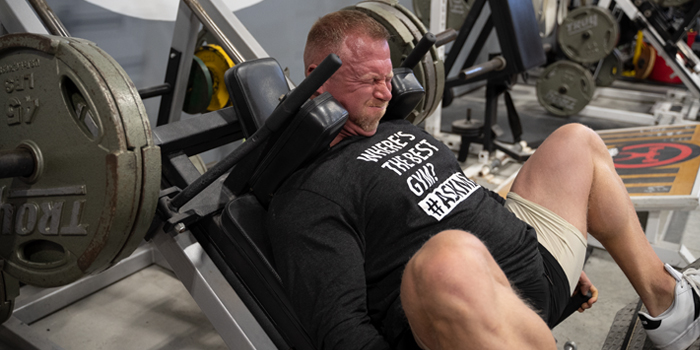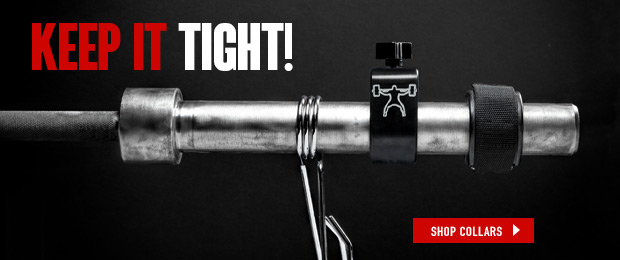
2022 seemed to creep up on us, and while I remember sitting at my computer with fear and uncertainty at this very moment last year, I can happily say I am more at peace with my future and where the industry is going.
I am not a coach who sugar coats things. I like to say how it is, which I find has its benefits and drawbacks. Being a coach and living on the sidelines won't get you too far, so you have to learn to find that happy medium of coaching and analyzing.
RELATED: The Dark Side of Personal Training
Rather than sit here and tell you about how "Peleton is here to stay" or "Commercial gyms are gone forever," I will give you ten truths of strength that I realized within this past year as a coach and lifter.
10 Truths of Strength
You Can't Just Show Up
A good online coach is actually much more demanding than an in-person coach. In my opinion, an online coach should have at least seven to eight years of in-person experience. Working online requires constant attention to detail since second-by-the-second feedback is not available. There are no switching things on the fly. Everything online requires constant attention and adjustments. Online coaches must be smart, motivating, and supportive. The daily requirements are more than "showing up" for your session, which makes this much harder when it's done right.
The Basics Still Work
Advanced or "special" methods and lifting protocols are not the most important things a good coach uses. They most likely know about these methods, BUT they know who they're for and how to deploy them properly. These methods include clusters, rest-pause sets, wave-loading, contrasts, and other program specialties. You might ask what is important? These are the days you get to the gym, perform some sort of progressive overload, and get the heck out!
Live a Lifestyle Full of Recovery, Diet, and Balance
The best programs won't result favorably if recovery, diet, and balance aren't a lifestyle. Over the years, my life has changed drastically. I learned how stress and lack of recovery impact my training in just the last year. You can get results with any program you choose if it contains progressive overload, all while adhering to a regimen of rest, a good diet, and stress control. The key is controlling the variables like consistency, sleep, and stress. Once you realize you can't live the younger lifestyle you once had, your body and mind will thank you. Watch as you progress.
There Is NOT a Best Exercise
The deadlift isn't king, hack squats are not the only way to grow quads, and bench pressing isn't a sure-fire way to popping pecs. What is best for each individual is your body structure, goals, and experience. Just because you like an exercise doesn't make it right for you or others. You should avoid claiming specific movements as the "only way" to grow until you know your anatomical structure and how each exercise aids or hurts it. This is where having an open mind about training can be helpful. Unfortunately, most of us have a solid rotation of 10-20 exercises we like and tend to stick with.
Don't Floor the Gas Pedal
If you want to lose fat and get lean, amping up your training, intensity, and volume is a sure-fire way to take three steps back. When you put yourself in a caloric deficit, you begin depleting glycogen and adrenaline increases, leading to burnout by rendering your adrenergic receptors. This also increases cortisol, and while a little bit is a good thing, too much can make recovery harder and increase the amount of stress placed on your body. So many New Year's folks try committing to six to seven days a week in the gym, dropping calories below 1500 and avoiding carbs.
Not only will this give you sudden energy drops after about three weeks, but you will begin making fat loss harder. Cortisol increases the conversion of noradrenaline into adrenaline. That's why it's hard to sleep when you're stressed out or worried.
Remember, carbs are essential for muscle growth and are helpful for mTor and IGF-1, both very important for building muscle. New research has found low-carb diets to decrease IGF-1, making muscle building much harder. Can it be done without carbs? Sure, but it's not ideal nor something you can sustain. It's like driving a car across the country when you can take a plane.
Move Throughout the Day
Our country has an obesity problem that largely stems from inactivity. Sure, nutritional choices make us gain weight, but you can offset this simply by moving more. The problem is our country as a whole fails to do so. If you need a place to start, try getting 6-8k steps per day. For most weightlifters, I like using the analogy of using weights as your entree and cardio as your side dish. Train hard and move throughout the day. Check out Jason Brown's latest article on conjugate conditioning or GPP work to keep your strength without beating up your joints. You don't need to be trudging on cardio equipment daily, but get some heavy stuff and go for a walk, dive into a couple of bar complexes, or push a sled.
Many Coaches Over-Analyze and Under-Deliver
This profession has gotten way out of the basics. From social media wars to Twitter posts attacking other individuals, it's no wonder our industry has become one of the most affected by this pandemic. Many fitness professionals focus on the wrong things with their business and clients. No one cares about "new" and "innovative" or what worked for you. They care about getting to the root cause of their problem and the result.
Many new-age trainers fail to realize that the basics and social skills are at the peak of the pyramid when it comes to a client's success. If you want to be a successful coach, start putting your clients ahead of your own needs. It's not about you, but about them.
Volume is Not the Driver for Hypertrophy
Hear me out, mechanical tension is the utmost important thing when it comes to hypertrophy. What this means is that you should only need two to four work sets, given that you use enough intensity and focus! The tension you place on the muscle during each lift matters most for growing. This is not indicative of powerlifting or sports performance, but using eight to ten-plus sets and 90-minute sessions is unnecessary for most trying to grow. As many of us age, our body's ability to recover narrows. On top of that, muscle protein synthesis becomes increasingly difficult. You can combat this by dropping junk volume and getting to work with intent and focus on your work sets.
Not Every Day Will Be A Home Run
Get used to it. We all have busy lives, kids, jobs, and stress. If you get to the gym and you're not feeling it, at least get through the warm-up. Feel better? Try the first exercise. Work with consistency and what you have. In my opinion, if you are not giving near maximal effort, it's better to give ten minutes of 100 percent than 60 minutes of half-assed garbage.
Commit
Don't be a wuss and freak out the second you can pinch an inch on your love handles. You will gain some fat. The problem is that most men begin bulking when they are too fat. Try leaning down first and get your body fat down. Then, begin a slight surplus of 300 to 400 calories per day. Adjust for personal preference. Realize, going hog wild won't help your cause, and trying to eat a little more than your maintenance will have you adding an inch to your biceps in a decade.
Commit a solid four to six months to muscle building and add two to three mini cuts to keep fat gain at bay. Your cuts can be a little more restrictive since it's for a shorter time frame. Just don't wimp out and call it quits when you notice some fat. It's inevitable.
Conclusion
A whole year of training, failing, coaching, learning, and reflecting can truly help you grow.
The key is realizing where you were and how you're evolving. The best coaches learn from their screw-ups. If you were to ask any strength coach what they would do with a written program they made ten years ago, they'd probably laugh and explain how a monkey could have made it.
We all need to progress as lifters and coaches, but it starts with understanding where you've come in the recent success and struggles. Make 2022 a year you can remember by documenting your journey and being consistent.
Remember, while some of us believe the ultimate key to success is a program utilizing several training concepts, the easiest way to get results is consistency.
Happy New Year!
Mike Over is a NASM master trainer and owner of Over-Achieve Fitness in Pennsylvania. He works with hundreds of everyday gym-goers and athletes of all levels.










